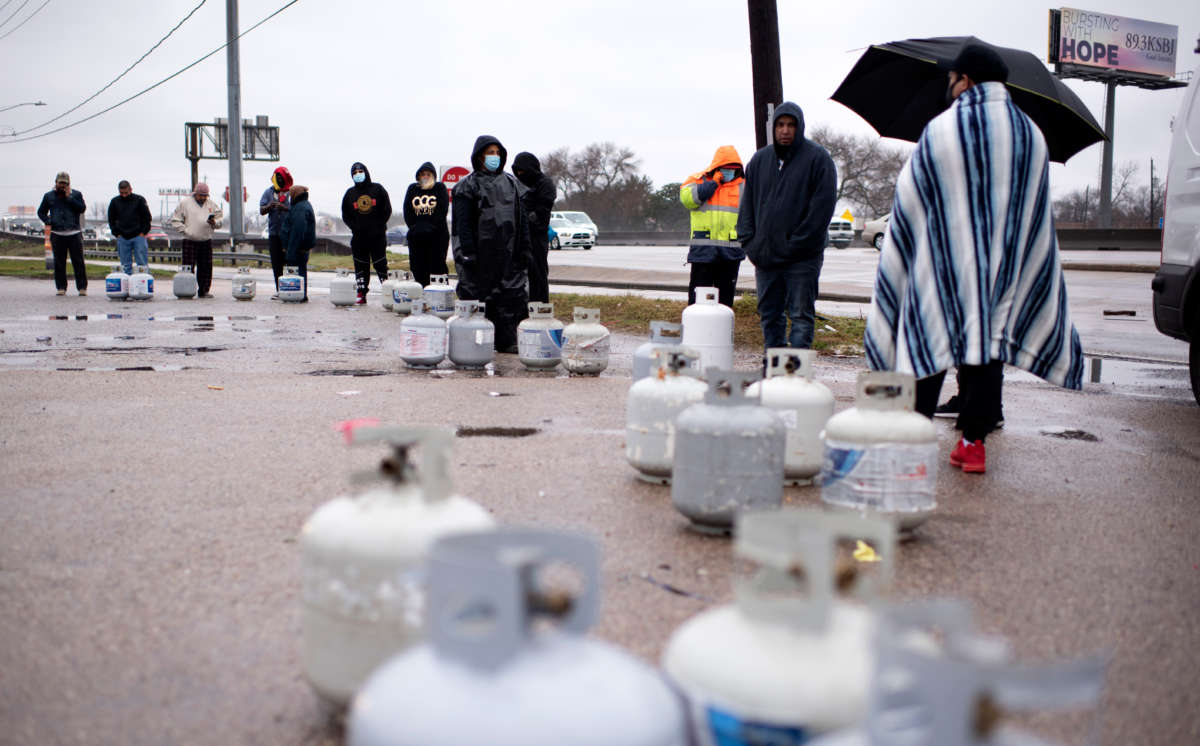Did you know that Truthout is a nonprofit and independently funded by readers like you? If you value what we do, please support our work with a donation.
As many in Texas wake up still without power on Thursday morning, millions are now also having to contend with water shutdowns, boil advisories, and empty grocery shelves as cities struggle with keeping infrastructure powered and supply chains are interrupted.
As of estimates performed on Wednesday, 7 million Texans were under a boil advisory. Since then, Austin has also issued a citywide water-boil notice due to power loss at their biggest water treatment plant. Austin Water serves over a million customers, according to its website.
With hundreds of thousands of people still without power in the state, some contending that they have no water coming out of their faucets at all, and others facing burst pipes leading to collapsed ceilings and other damage to their homes, the situation is dire for many Texans facing multiple problems at once.
Even as some residents are getting their power restored, the problems are only continuing to layer as the only grocery stores left open were quickly selling out of food and supplies. As many without power watched their refrigerated food spoil, lines to get into stores wrapped around blocks and buildings and store shelves sat completely empty with no indication of when new shipments would be coming in. Food banks have had to cancel deliveries and schools to halt meal distribution to students, the Texas Tribune reports.
A supermarket in South Austin, Texas, the only store that was opened in the area, saw empty shelves and long lines as shoppers stocked up amid historic cold weather and power outages https://t.co/U2O76Afv5t pic.twitter.com/I3WNVNSsgQ
— Reuters (@Reuters) February 18, 2021
People experiencing homelessness, including a disproportionate number of Black residents, have especially suffered in the record cold temperatures across the state. There have been some reports of people being found dead in the streets because of a lack of shelter.
“Businesses are shut down. Streets are empty, other than a few guys sliding around in 4x4s and fire trucks rushing to rescue people who turn their ovens on to keep warm and poison themselves with carbon monoxide,” wrote Austin resident Jeff Goodell in Rolling Stone. “Yesterday, the line at our neighborhood grocery store was three blocks long. People wandering around with handguns on their hip adds to a sense of lawlessness (Texas is an open-carry state).”
The Texas agricultural commissioner has said that farmers and ranchers are having to throw away millions of dollars worth of goods because of a lack of power. “We’re looking at a food supply chain problem like we’ve never seen before, even with COVID-19,” he told one local news affiliate.
An energy analyst likened the power crisis to the fallout of Hurricane Katrina as it’s becoming increasingly clear that the situation in Texas is a statewide disaster.
As natural gas output declined dramatically in the state, Paul Sankey, who leads energy analyst firm Sankey Research, said on Bloomberg, “This situation to me is very reminiscent of Hurricane Katrina…. We have never seen a loss [of energy supply] at this scale” in mid-winter. This is “the biggest outage in the history [of] U.S. oil and gas,” Sankey said.
Many others online echoed Sankey’s words as “Katrina” trended on Twitter, saying that the situation is similar to the hurricane disaster in that it has been downplayed by politicians but may be uncovered to be even more serious in the coming weeks.
Experts say that the power outages have partially been caused by the deregulation of the state’s electric grid. The government, some say, favored deregulatory actions like not requiring electrical equipment upgrades or proper weatherization, instead relying on free market mechanisms that ultimately contributed to the current disaster.
Former Gov. Rick Perry faced criticism on Wednesday when he said that Texans would rather face the current disaster than have to be regulated by the federal government. And he’s not the only Republican currently catching heat — many have begun calling for the resignation of Gov. Greg Abbott for a failure of leadership. On Wednesday, as millions suffered without power and under boil-water advisories, the governor went on Fox to attack clean energy, which experts say was not a major contributor to the current crisis, and the Green New Deal.
After declaring a state of emergency in the state over the weekend, the Joe Biden administration announced on Wednesday that it would be sending generators and other supplies to the state.
A terrifying moment. We appeal for your support.
In the last weeks, we have witnessed an authoritarian assault on communities in Minnesota and across the nation.
The need for truthful, grassroots reporting is urgent at this cataclysmic historical moment. Yet, Trump-aligned billionaires and other allies have taken over many legacy media outlets — the culmination of a decades-long campaign to place control of the narrative into the hands of the political right.
We refuse to let Trump’s blatant propaganda machine go unchecked. Untethered to corporate ownership or advertisers, Truthout remains fearless in our reporting and our determination to use journalism as a tool for justice.
But we need your help just to fund our basic expenses. Over 80 percent of Truthout’s funding comes from small individual donations from our community of readers, and over a third of our total budget is supported by recurring monthly donors.
Truthout has launched a fundraiser to add 340 new monthly donors in the next 5 days. Whether you can make a small monthly donation or a larger one-time gift, Truthout only works with your support.
